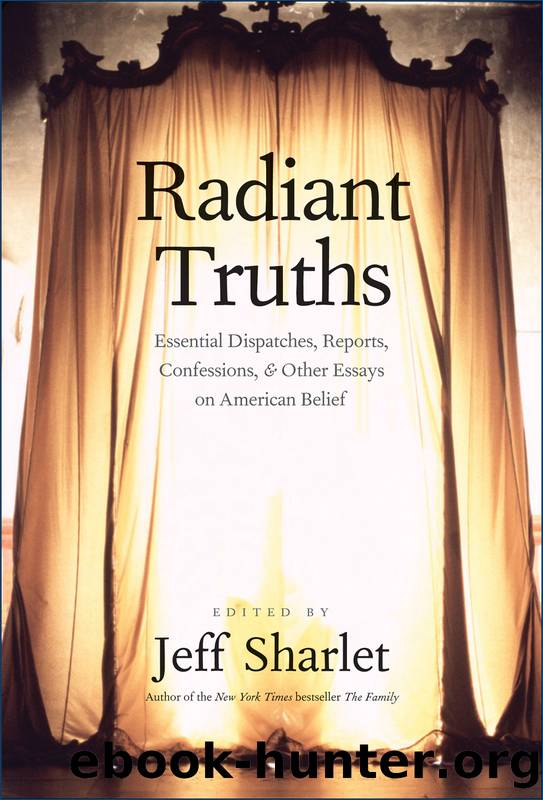Radiant Truths by Jeff Sharlet

Author:Jeff Sharlet
Language: eng
Format: epub
Publisher: Yale University Press
Published: 2014-11-15T00:00:00+00:00
1977
Beginning to See the Light, the collection of essays from which âTruth and Consequencesâ is excerpted, was out of print when I came across it in an artistsâ colony library committed to saving the work of everyone whoâd ever been through there. Itâs criticism. Narrative criticism: responses to Dylan, Elvis, the Who, the Velvet Underground, and others that are also works of literary journalism, stories of experience fully sensual and fully intellectual at the same time. Iâd never read anything like them. This was before I knew that Willis was one of the great rock writers of the sixties and seventies, easily as fabulous as Lester Bangs, Greil Marcus, and the rest of the men who became a canon. Willis wasnât included. First, because she was a woman. Second, because she demolished the fan boysâ fetishization of authenticity, their obsession with the original blues and the bootleg riff, the esoteric over the democratic.
Her concern, she wrote in her introduction, wasnât purity, it was liberation, and sheâd seize it wherever she could find it. âWhy,â she asked, âregard commercial art as intrinsically more compromised than art produced under the auspices of the medieval church, or aristocratic patrons? Art has always been in some sense propaganda for ruling classes and at the same time a form of struggle against them. Art that succeeds manages to evade or transcend or turn to its own purposes the strictures imposed on the artist; on the deepest level it is the enemy of authority, as Plato understood.â
âNext Year in Jerusalem,â the essay from which âTruth and Consequencesâ is taken, is a twenty thousandâword investigation, originally produced under the auspices of Rolling Stone, of what it might mean to Willis to become a religious Jew. Twenty thousand words! About ordinary Jews, in a mass media magazine about pop culture. This really was new journalism. Not that it came out of a vacuum. Willisâs deliberately plain prose echoes the reportage of Meridel Le Sueur, another feminist writer for whom the ornamentation of literary fashion seemed an unnecessary, even dangerous, burden. And what Willis describes in her introduction as her fundamental, animating quarrel with the âpuritanical discomfort with the urgeâwhatever form it takesâto gratification nowâ recalls the redeeming quality of Menckenâs rage against religion, his hatred of those he saw as the enemies of pleasure. Willisâs antidote to that angerââ it is the longing for happiness that is potentially radical,â she writes, âwhile the morality of sacrifice is an age-old weapon of rulersââmight almost have been written by that Christian crusader W. T. Stead, the original ânew journalist,â in 1894.
What follows is this bookâs second trip to the Holy Land, with Willis as a not-so-innocent abroad, immersing herself in the world of her brother Mike, a once-secular Jew who has recently converted to Orthodoxy.
Download
This site does not store any files on its server. We only index and link to content provided by other sites. Please contact the content providers to delete copyright contents if any and email us, we'll remove relevant links or contents immediately.
| Africa | Americas |
| Arctic & Antarctica | Asia |
| Australia & Oceania | Europe |
| Middle East | Russia |
| United States | World |
| Ancient Civilizations | Military |
| Historical Study & Educational Resources |
The Dawn of Everything by David Graeber & David Wengrow(1707)
The Bomber Mafia by Malcolm Gladwell(1623)
Facing the Mountain by Daniel James Brown(1553)
Submerged Prehistory by Benjamin Jonathan; & Clive Bonsall & Catriona Pickard & Anders Fischer(1455)
Wandering in Strange Lands by Morgan Jerkins(1430)
Tip Top by Bill James(1416)
Driving While Brown: Sheriff Joe Arpaio Versus the Latino Resistance by Terry Greene Sterling & Jude Joffe-Block(1376)
Red Roulette : An Insider's Story of Wealth, Power, Corruption, and Vengeance in Today's China (9781982156176) by Shum Desmond(1359)
Evil Geniuses: The Unmaking of America: A Recent History by Kurt Andersen(1354)
The Way of Fire and Ice: The Living Tradition of Norse Paganism by Ryan Smith(1336)
American Kompromat by Craig Unger(1315)
F*cking History by The Captain(1304)
It Was All a Lie by Stuart Stevens;(1300)
American Dreams by Unknown(1286)
Treasure Islands: Tax Havens and the Men who Stole the World by Nicholas Shaxson(1274)
Evil Geniuses by Kurt Andersen(1257)
White House Inc. by Dan Alexander(1212)
The First Conspiracy by Brad Meltzer & Josh Mensch(1174)
The Fifteen Biggest Lies about the Economy: And Everything Else the Right Doesn't Want You to Know about Taxes, Jobs, and Corporate America by Joshua Holland(1126)
